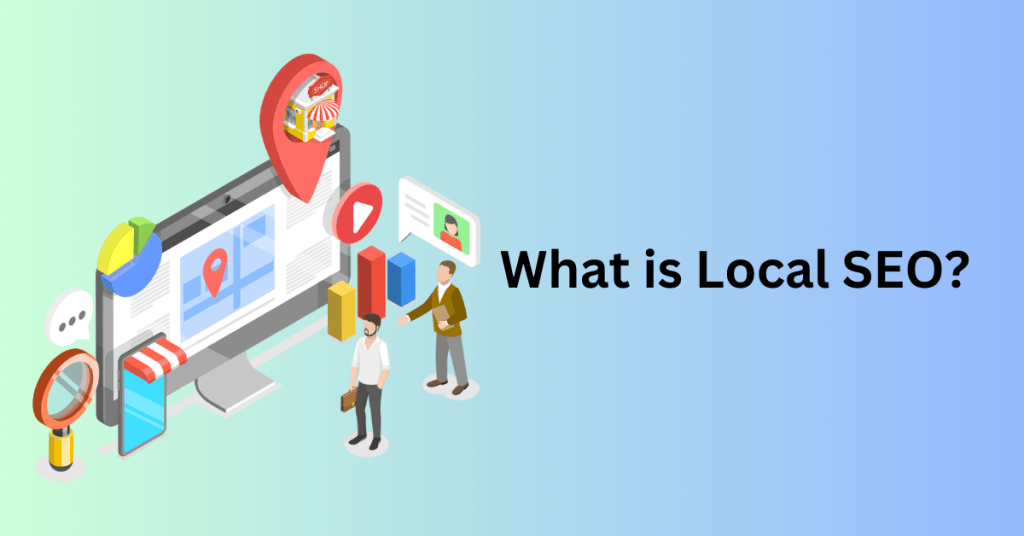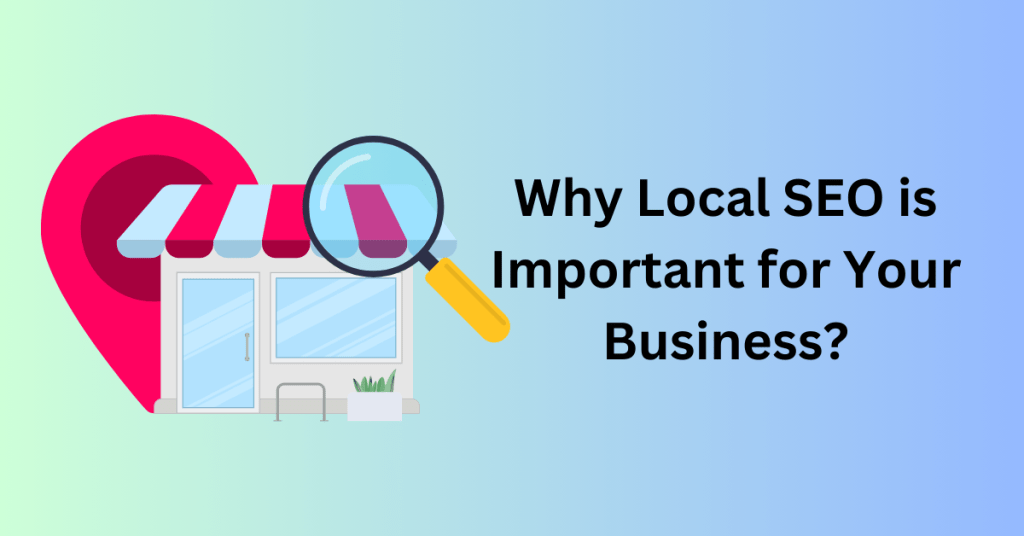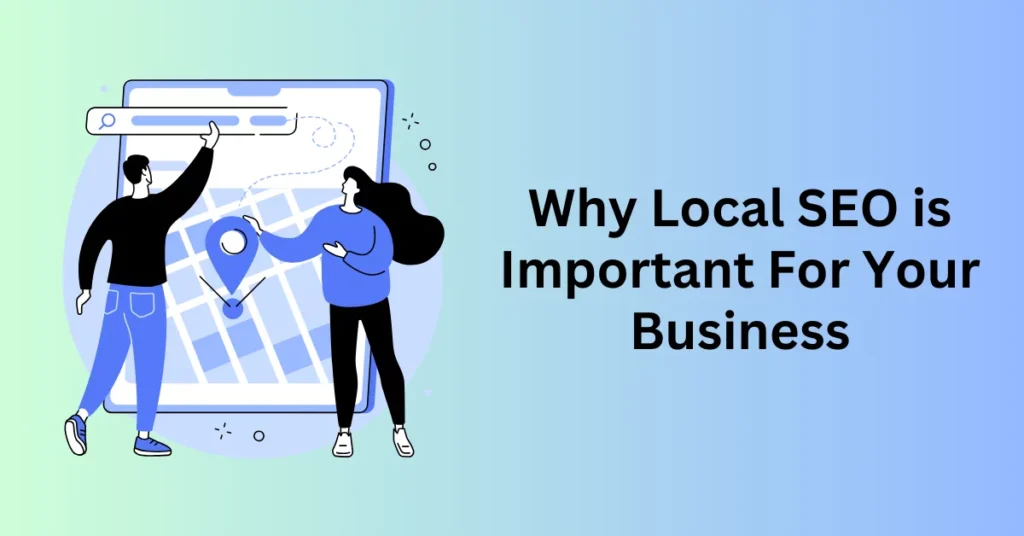When you need to find a restaurant, a nearby car repair shop, or any local service, what’s the first thing you do? You search for it online! This everyday behaviour highlights the importance of local search, which has become an integral part of how people find businesses around them. In fact, as of 2022, 78% of consumers searched for local SEO business information online at least once a week.
If your business has a physical location, these numbers underscore a critical opportunity: ensuring that local consumers can find you easily online. Whether it’s through Google, Bing, or other platforms, a strong online presence directly influences foot traffic, leads, and ultimately, sales.
This is where local search engine optimization (SEO) comes into play. Optimizing your website and online listings for local search ensures your business stands out. When potential customers search for services or products in your area, your business will appear prominently. Effective local SEO doesn’t just make your business visible. It makes it discoverable to the people most likely to walk through your doors.
Start Your WordPress Website Today
What is Local SEO?

Local SEO (Search Engine Optimization) is a digital marketing strategy designed to boost a business’s visibility in location-specific search results. It helps connect businesses with potential customers searching for products or services within a defined geographic area. This strategy is especially important for businesses that have physical locations or serve specific regions, such as restaurants, car dealerships, dental offices, or local service providers.
When users perform searches with a geographic qualifier, like a city, neighborhood, or “near me,” search engines prioritize results relevant to that location. For example, if someone searches for “car dealership in Los Angeles, California” or “car dealerships near me,” they will see businesses optimized for those specific queries. Search engines use factors like the user’s device location, business listings, and reviews to deliver the most relevant, localized results.
Key Components of Local SEO
To successfully optimize for local searches, businesses employ several key techniques:
- Optimizing Google Business Profile (GBP):
Claiming and optimizing your GBP (formerly Google My Business) listing is foundational for local SEO. Ensure your business name, address, phone number (NAP), hours of operation, and categories are accurate and consistent. - Building Local Citations:
Citations are mentions of your business name, address, and phone number on other websites, such as local directories, Yelp, or industry-specific platforms. Consistency across these citations helps establish trust with search engines. - Using Local Keywords:
Incorporate location-specific keywords into your website content, meta descriptions, and headers. For instance, “affordable Los Angeles car dealership” is a keyword that aligns with local intent. - Generating Reviews:
Positive reviews on platforms like Google, Yelp, and Facebook not only enhance credibility but also influence local search rankings. Encourage satisfied customers to leave feedback. - Creating Location-Specific Pages:
Develop individual pages for each service area or location you serve. For example, a car dealership with multiple locations could create pages like “Car Dealership in Downtown Los Angeles” and “Car Dealership in Santa Monica.” - Mobile Optimization:
Many local searches happen on mobile devices. Ensure your website is mobile-friendly and loads quickly to capture this traffic. - Building Backlinks from Local Sources:
Partner with local businesses, sponsor events, or collaborate with community organizations to earn backlinks from local websites.
Why Local SEO is Important for Your Business?

If your business serves a specific town, city, or region, investing in local SEO is crucial for attracting nearby customers. Local SEO enhances your visibility among people searching for products or services in your area, ensuring you don’t miss out on high-intent traffic that could translate into leads, sales, or in-store visits.
Key Reasons to Prioritize Local SEO:
- Attract Nearby Customers:
Potential customers in your vicinity are actively searching for businesses like yours. Local SEO helps you appear in those searches, connecting you with people who are most likely to visit your location or purchase your services. - Drive Leads and Sales:
Local search is one of the most effective channels for generating qualified leads. Users searching with local intent (e.g., “best pizza near me” or “car repair in Chicago”) are often ready to take immediate action, making them valuable prospects. - Boost Online and Offline Traffic:
Appearing in local search results, particularly in Google’s “local pack” or on Google Maps, increases your chances of attracting both online inquiries and physical visits to your store or office. - Stay Ahead of the Competition:
Many businesses are already leveraging local SEO to capture local audiences. Ignoring it could mean falling behind competitors who rank higher and dominate your area’s search results. - Cost-Effective Marketing:
While local SEO may require effort and some investment, it delivers high returns by targeting users with strong purchase intent. Additionally, businesses often implement local SEO strategies unknowingly by maintaining accurate business listings and engaging with online reviews.
Local SEO is only growing in importance as consumers increasingly rely on location-based searches and mobile devices. Businesses that invest in local SEO today are better positioned to capture future growth in their local markets.
How Does Local SEO Work?
Local SEO focuses on helping businesses rank higher in search results for geographically relevant queries. It revolves around three main factors: relevance, distance, and prominence.
1. Relevance: Matching Your Business to User Queries
Relevance measures how well your business aligns with a user’s search intent. Search engines determine relevance based on your business information, keywords, and content.
- Best Practices to Improve Relevance:
- Use location-specific keywords in your website content, meta descriptions, and titles (e.g., “affordable wedding planners in Miami”).
- Create localized content, such as blog posts, service pages, or guides tailored to your area.
- Ensure your Google Business Profile and online listings clearly describe your products or services.
- Example:
A local SEO blog might provide tips on “optimizing for small-town businesses,” offering advice tailored to its target audience’s location.
2. Distance: Proximity to the Searcher
Search engines factor in the user’s location to prioritize businesses nearby. This is especially true for mobile searches where users often rely on “near me” queries.
- Best Practices to Optimize for Distance:
- Keep your business’s address, contact details, and service areas consistent across all platforms (e.g., Google Business Profile, Yelp, directories).
- Use local directories and ensure your business is listed in region-specific categories.
- Utilize location extensions in paid ads for increased visibility.
3. Prominence: Building Authority and Trust
Prominence refers to how reputable or well-known your business is in your community. Search engines use various signals like reviews, backlinks, and social media activity to measure prominence.
- Best Practices to Enhance Prominence:
- Actively encourage customers to leave reviews on Google, Yelp, or other platforms. Respond to all reviews—both positive and negative—to demonstrate engagement.
- Build quality backlinks from local blogs, news outlets, or community organizations.
- Maintain an active social media presence and participate in local events or sponsorships to increase visibility.
- Example:
A business with numerous 5-star reviews, mentions in local news articles, and an engaged Facebook page will likely outrank competitors in local search results.
Start Your WordPress Website Today
Maximize Your Local SEO with These Proven Tactics

Implementing a strong local SEO strategy is essential for businesses looking to attract nearby customers. To ensure your business stands out in local search results, follow these comprehensive steps:
1. Create Localized Website Content
A key element of a successful local SEO strategy is crafting content that highlights your business’s geographic location. Start by displaying your name, address, and phone number (NAP) prominently on your website. This information should appear in the header or footer of every page and on a dedicated Contact page.
Next, incorporate local keywords into your content. For example, if you’re a dentist in New York City, use phrases like “NYC Dentist” on your service pages. Avoid keyword stuffing, which can lead to penalties from search engines. Instead, use keywords naturally in page titles, headings, meta descriptions, and image alt tags. By creating high-quality, locally relevant content, you can significantly improve your visibility in local search results.
2. Claim and Optimize Your Google Business Profile
With Google dominating the search engine landscape, claiming your Google Business Profile (formerly Google My Business) is an essential step for local SEO success. This free tool allows businesses to connect directly with local customers through Google Search and Google Maps. Start by filling out your profile completely, including your NAP information, website URL, business hours, and a detailed description of your services. Adding high-quality photos of your storefront, team, or products can make your profile more appealing and trustworthy.
Additionally, keep your information up to date—especially for special hours or promotions. Encouraging customers to leave reviews on your profile not only enhances credibility but also helps improve your rankings in local searches. A fully optimized Google Business Profile ensures your business is visible and appealing to local audiences.
3. Leverage Online Directories and Listings
Online directories and business listings are valuable tools for improving local visibility and driving traffic. These platforms serve as centralized databases where customers can easily find your business information. To get started, complete your profiles on popular directories like Bing Places, Yelp, Whitepages, and Foursquare. Additionally, ensure your NAP (Name, Address, Phone Number) information is accurate and consistent across all platforms. Discrepancies not only confuse potential customers but can also harm your search rankings.
Furthermore, adding extra details such as your business category and operating hours can make your listings even more effective. By consistently maintaining a strong presence on these platforms, you not only improve your chances of connecting with local customers but also build valuable backlinks. These backlinks, in turn, help boost your search engine authority and enhance your overall online visibility.
4. Capitalize on Customer Reviews
Customer reviews play a pivotal role in local SEO, with nearly half of local consumers trusting them as much as personal recommendations. Positive reviews not only enhance your credibility but also influence purchasing decisions. To encourage reviews, politely ask satisfied customers to share their experiences on platforms like Google, Yelp, or Facebook, and provide direct links to simplify the process. Additionally, consider industry-specific review sites that cater to your niche, such as TripAdvisor for hospitality businesses or The Knot for wedding vendors.
Make it a point to respond to all reviews—express gratitude for positive feedback and address any concerns raised in negative reviews. Engaging with customers in this way demonstrates excellent customer service and builds trust. Reviews also often include backlinks to your website, driving traffic and improving your search engine rankings, making them a critical part of your local SEO strategy.
Comprehensive Guide to Local SEO Tools and Services
Local SEO tools and services are crucial for helping businesses improve their visibility in local search results, attract nearby customers, and stay competitive in today’s digital landscape. Below, we highlight six prominent local SEO tools and their contributions to a robust local SEO strategy.
1. Google My Business (GMB)
Google My Business (GMB) is an essential, free tool for businesses seeking to establish a strong online presence. It allows you to manage your business’s visibility across Google, including in areas such as local search results, Google Maps, and Google’s Knowledge Graph. By properly optimizing your GMB profile, you can significantly enhance your local SEO and ensure that potential customers find you when searching for services or products in your area.
A well-optimized GMB profile includes key information like:
- Business Name
- Address
- Phone Number (NAP information)
- Operating Hours
- Website Link
These details provide potential customers with all the necessary information to contact or visit your business. But optimizing your GMB profile does more than just provide basic details—it helps your business rank higher in local search results. The more accurate and engaging your information is, the more likely it is that your business will appear prominently in search results.
In addition to basic business information, GMB allows you to showcase reviews, photos, and updates, all of which contribute to your business’s credibility and help you stand out from the competition. Positive reviews build trust, while high-quality photos give a visual representation of your business, making it more appealing to potential customers.
Pro Tip: To keep your GMB profile fresh and engaging, regularly update it with new posts, photos, and special offers. Frequent updates show Google and potential customers that your business is active and well-maintained. Additionally, responding promptly to reviews—whether they’re positive or negative—helps build customer trust and improve your reputation. This consistent engagement can lead to stronger local SEO results, more customer inquiries, and increased foot traffic.
2. Google Search Console
Google Search Console is an essential tool for businesses looking to monitor and enhance their website’s performance in Google search results. It delivers valuable insights into your site’s visibility and user engagement, ensuring your local SEO efforts remain effective.
One of its standout features is Performance Metrics. This tool enables businesses to analyze data like clicks, impressions, and average ranking positions for local queries. By monitoring performance for location-specific searches, you can pinpoint what’s working and identify areas for improvement in your local SEO strategy.
Another important feature is Crawl Error Detection, which identifies problems that may prevent Googlebot from properly indexing your website. Resolving these issues ensures that all relevant pages are indexed and displayed in search results, increasing your chances of ranking higher for local search terms.
Additionally, Google Search Console offers Local Keyword Insights. These insights reveal which local search terms are driving traffic to your site. Understanding these keywords allows businesses to optimize content for high-value local terms, boosting visibility in specific geographic areas.
By leveraging these features, businesses can fine-tune their local SEO strategies and achieve greater visibility in local search results.
3. Yext
Yext is a powerful tool that simplifies managing your business’s online presence across various platforms. By streamlining this process, it helps keep your local SEO strategy strong while offering several key benefits that enhance visibility in local search results.
To begin with, one major advantage of Yext is Directory Synchronization. This feature ensures your NAP (Name, Address, Phone Number) information remains consistent across directories, social media platforms, and review sites. By maintaining accurate and uniform business information, you not only avoid confusion for customers and search engines but also improve your local search rankings. In other words, consistency in your business details creates a solid foundation for effective local SEO.
In addition to synchronization, Yext also strengthens your Local Citations, which refer to mentions of your business across the web. Consistent citations help establish trust with search engines by signaling that your business is both legitimate and reliable. As a result, uniformity across directories and platforms becomes essential for boosting local search performance and standing out from competitors.
Moreover, Yext provides the advantage of Real-Time Updates, a feature that allows businesses to quickly modify crucial details such as holiday hours, promotions, or location changes across all connected platforms simultaneously. This capability ensures customers always have access to the most current information, which not only improves their overall experience but also prevents potential frustrations that could arise from outdated listings.
4. Synup
Synup is an invaluable tool for businesses seeking to improve their local SEO through effective management of local listings and online reputation. With features tailored to ensure consistency and enhance visibility in local search results, it offers a comprehensive solution for businesses aiming to strengthen their online presence.
To start, one of Synup’s most notable features is Review Management, which enables businesses to track, respond to, and analyze customer reviews across multiple platforms. Since customer reviews play a pivotal role in local SEO rankings, managing them effectively is crucial. Positive feedback can enhance your online reputation and significantly boost visibility in search results. Furthermore, by responding promptly and thoughtfully to reviews, businesses can foster stronger customer relationships and maintain a favourable reputation, which is essential for long-term success.
In addition to managing reviews, Synup offers Sentiment Analysis, a powerful tool for gaining deeper insights into customer feedback. This feature helps businesses understand how customers perceive their brand, enabling them to fine-tune services and marketing strategies to better meet the needs of their local audience. By leveraging these insights, businesses can stay ahead of customer expectations and improve overall satisfaction.
Another critical feature of Synup is its Local Listings Audit, which identifies and resolves inconsistencies in business information across the web. Accurate and consistent details, such as your name, address, and phone number (NAP), are vital for improving local SEO. They also ensure customers can easily find and connect with your business online, which can directly impact your bottom line.
Synup’s tools for managing reviews, analyzing customer sentiment, and ensuring accurate local listings are indispensable for businesses looking to attract more local customers. By improving your online reputation and maintaining consistency, Synup positions itself as an essential resource for boosting visibility in local search results and driving growth.
5. BiQ
BiQ is a dynamic SEO tool designed to help businesses achieve local SEO success through its range of powerful features. One of its standout capabilities is Local Keyword Research, which enables businesses to identify high-value keywords tailored to their specific location and target audience. By understanding what local customers are searching for, businesses can strategically optimize their content to attract more relevant traffic.
Another key feature is Content Optimization, which helps refine website content to align more closely with local search intent. This ensures that your site not only attracts visitors but also provides the information and value they’re looking for, increasing the likelihood of conversions.
Additionally, BiQ offers Rank Tracking, allowing you to monitor your local search rankings consistently. By keeping an eye on how your website performs in search results, you can measure the effectiveness of your SEO efforts and adjust your strategy as needed.
BiQ’s affordability and comprehensive features make it particularly useful for small businesses looking to enhance their local SEO performance without breaking the bank. It offers a scalable and efficient solution to stand out in local search results, helping businesses connect with their local audience and drive growth.
Additional Best Practices for Local SEO
To maximize your local search visibility and attract nearby customers, implementing advanced local SEO strategies is essential. Here’s a detailed breakdown of key practices to enhance your local SEO efforts:
Optimize for Mobile Devices
With a significant portion of local searches conducted on smartphones, ensuring your website is mobile-friendly is no longer optional. A responsive design, fast-loading pages, and an intuitive mobile user experience can dramatically impact how potential customers interact with your site. Mobile optimization not only improves user engagement but also aligns with Google’s mobile-first indexing, ensuring better rankings in local search results.
Utilize Local Structured Data Markup
Adding structured data markup, such as schema.org, to your website helps search engines understand your business better. By using schema for elements like your address, phone number, business hours, and customer reviews, you make it easier for search engines to display accurate information. This improves your chances of appearing in rich snippets and local search packs. As a result, more traffic may be driven to your site.
Build Local Backlinks
Earning backlinks from reputable local websites, directories, and organizations can significantly boost your local SEO authority. Partner with local businesses, sponsor community events, or join local directories to secure quality backlinks. Collaborating with neighborhood publications or blogs can also amplify your reach and establish your business as a trusted entity within the community.
Engage with the Local Community and Influencers
Getting involved in your community can have a direct impact on your local SEO. Participate in local events, sponsor organizations, or collaborate with influential businesses and individuals in your area. Building these relationships often leads to meaningful partnerships and backlinks, while also increasing your brand visibility and trustworthiness among locals.
Leverage Local Sponsorships and Partnerships
Supporting local initiatives, such as sports teams, charities, or community organizations, is a powerful way to strengthen your brand’s local presence. These sponsorships often come with opportunities for mentions and links on the sponsored entity’s website, which can improve your SEO. Beyond the digital benefits, local sponsorships build goodwill and reinforce your business’s commitment to the community.
Monitor and Respond to Customer Reviews
Customer reviews are a critical component of local SEO rankings. Regularly monitor reviews across platforms like Google My Business, Yelp, and social media. Responding promptly to both positive and negative feedback demonstrates your dedication to customer satisfaction and can help turn potential negative perceptions into positive outcomes. A proactive approach to review management can improve your reputation and influence future customers’ decisions.
Optimize for “Near Me” Searches
The rising trend of “near me” searches emphasizes the importance of including location-based keywords in your website content. Phrases like “pizza delivery near me” or “best dentists near me” often dominate local queries. To capture these searches, ensure your site content and metadata include relevant geographic markers, making it easier for search engines to connect you with nearby users.
Encourage User-Generated Content (UGC)
User-generated content, such as customer photos, videos, and reviews, can be a goldmine for local SEO. Encourage customers to share their experiences with your business on social media or review platforms. You can incentivize UGC through contests, discounts, or featured posts. Not only does this provide authentic and fresh content for your brand, but it also fosters greater engagement and strengthens your presence in local search results.
By combining these best practices with a consistent effort to maintain and update your local SEO strategy, your business can achieve higher visibility, attract more local customers, and build long-lasting community relationships.
Track Your Local SEO Results and Keep Optimizing
Local SEO is a dynamic process influenced by numerous factors, which means your local keyword rankings can fluctuate regularly. These changes in rankings directly impact your website traffic and, consequently, your business performance. A sudden decline in rankings can result in reduced visibility, fewer leads, and a drop in revenue. To mitigate these risks, tracking your local SEO progress and adapting your strategy accordingly is essential.
One of the most effective ways to monitor and improve your local SEO efforts is by using Position Tracking tools. These tools enable businesses to:
- Track Local Keywords: Monitor specific keywords that drive local traffic to your website, even down to the ZIP code level. This granular tracking provides valuable insights into how your business performs in different geographic areas.
- Analyze SERP Features: Position Tracking tools often include the ability to track Search Engine Results Page (SERP) features, such as local packs, featured snippets, and reviews. Knowing how your business appears on SERPs helps refine your approach to capturing high-value real estate in local search results.
By continuously monitoring your local rankings, you can quickly identify declines and make data-driven adjustments to your strategy. This might include refining your website content, updating your Google My Business profile, acquiring new local backlinks, or improving your mobile user experience.
Final Thoughts: Why Local SEO is Important For Your Business
Local SEO is more than just a digital marketing strategy—it’s a vital tool for connecting with customers in your community and driving business growth. As online searches have become the go-to method for finding nearby businesses, ensuring your business ranks well in local search results is no longer optional; it’s essential for success. Whether you run a restaurant, a retail store, or a service-based business, local SEO not only helps attract customers but also builds trust and keeps you ahead of your competition.
By optimizing your online presence and adhering to local SEO best practices, you’re doing more than increasing visibility—you’re creating a seamless path for customers to discover and choose your business. In today’s fast-paced, mobile-driven world, where convenience often dictates decisions, investing in local SEO is a strategic move toward long-term growth and sustainability. Don’t wait to take action—start optimizing today and make it easy for local customers to find their way to your door.


